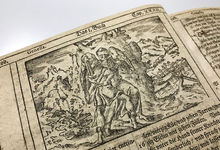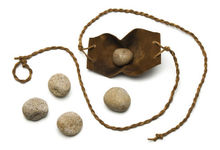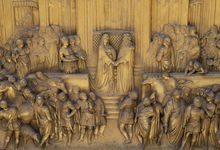The fall and rise of Joseph
Betrayed and sold, falsely accused and forgotten: the biblical Joseph had quite a few setbacks to deal with. But he did not become embittered and in the process experienced something that can also help people today who are being treated badly by others.

He must have been a real nuisance, this 17-year old Joseph: daddy’s little prince. He was son, tattletale, and scandalmonger rolled into one. And he was conceited and proud and did not have a grain of tact or sensitivity. Is this judgement not a little harsh ? Does the Bible text even render this information? Yes, the basic Hebrew text in any case.
Ketonet passim is the name of the colourful coat Joseph wore. Actually, it was a long-sleeved, ornate tunic reaching to the ankle, a gown worn by princes at the time of King David. It was comparable to the gown of a Priest, and distinguished someone who did not have to work for a living.
Dibbah ra’ah is the term used to describe the attitude the crown prince Joseph had towards his father, Jacob: whispering to his father and spreading malicious gossip of the worst kind about his brothers.
By telling his brothers about his dreams this snooty-nosed little upstart even rubbed his supremacy under their noses. Because by telling them about his dreams he was not only revealing his ambitions but also asserting a claim to prophecy.
“ … you meant evil against me”
The story of Joseph is the tale of a transformation, a veritable piece of world literature that has been set to music and recorded in a novel by one of the great writers of our time. Nearly a quarter of Genesis deals with the narrative of Joseph. It is not merely a sequence of individual episodes but has been composed in great detail. There are three separate instances in which dreams set the dramaturgical course. Then there are two instances in which pieces of clothing serve as proof of a lie. Joseph falls three times and rises again three times.
Joseph was betrayed by his brothers, who hated him. He ended up at the bottom of a well. But he managed to get back on his feet. His way led him as a slave into the house of Potiphar. Potiphar, who was captain of the guard for Pharaoh, was pleased with Joseph and trusted him and put him in charge of his household.
Potiphar’s wife accused Joseph of attempted rape. When he rejected the woman’s advances one final time she rushed to her husband and tried to destroy his life. Again Joseph landed on his feet, and not, as would have been expected, in the hands of the henchman. He was thrown into prison. There Joseph won the trust of the prison warden.
The king’s chief cupbearer, whose dream Joseph had interpreted, forgot about Joseph, but only until Pharaoh had some disturbing dreams. This was the beginning of Joseph’s rise to power.
“… but God meant it for good”
And how did Joseph’s transformation come about? He resisted the advances of a woman who had power over him. He knew that it was against God’s will. He also no longer used his gift of interpreting dreams to promote himself, but used it to first of all help individuals and, a little later, to save a whole nation. And he was prepared to forgive his brothers when he saw that they refused to hand Benjamin over to him, but were prepared to give their lives for him.
Joseph did not allow his fate to drive him to despair. On the contrary, it helped him to mature. And in the end he was able to say, “But as for you, you meant evil against me; but God meant it for good, in order to bring it about as it is this day, to save many people alive.”
Photo: Africa Studio - stock.adobe.com
Article info
Author:
Date:
Keywords:
Andreas Rother
12.09.2017
Bible Study
, Divine service,
Doctrinal instruction


















